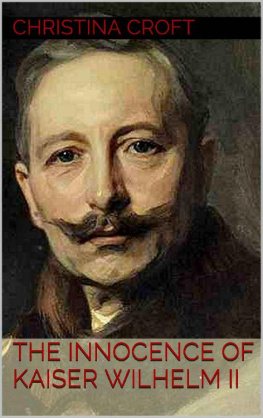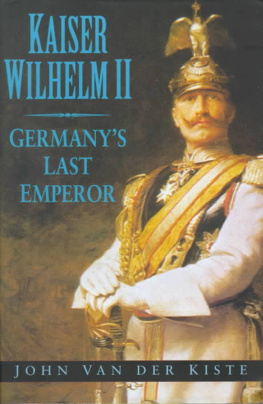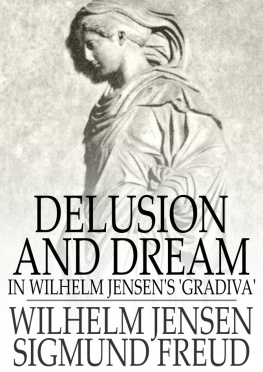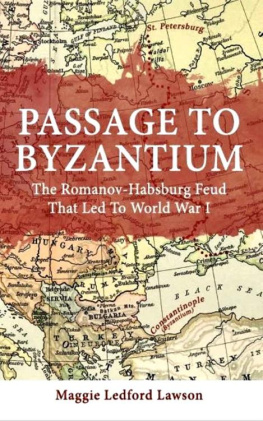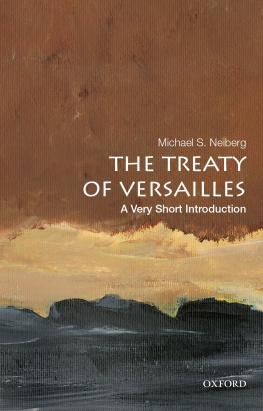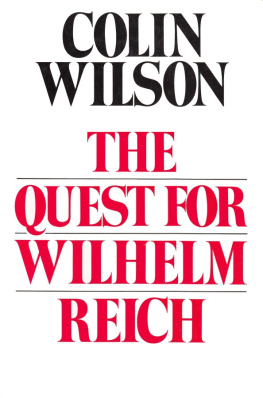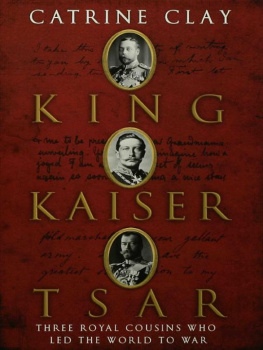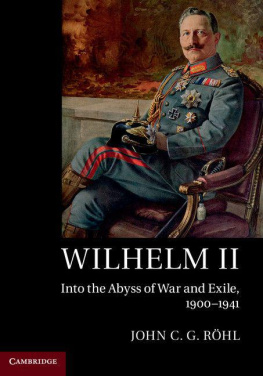Whos Who
Royalties
ALBERT I (1875-1934) King of the Belgians
ALEXANDER (1888-1943) Prince Regent and later King of Serbia
ALIX (1872-1918) Empress Alexandra of Russia; wife of Tsar Nicholas II; first cousin of Kaiser Wilhelm II
AUGUST-WILHELM Auwi (1887-1949) 4 th son of Kaiser Wilhelm II
CAROL I (1839-1914) King of Romania
DONA See Victoria Augusta
EDWARD VII Uncle Bertie (1841-1910) King of Great Britain; uncle of Kaiser Wilhelm II
EITEL-FRIEDRICH (1883-1942) 2 nd son of Kaiser Wilhelm
ELLA (1864-1918) Grand Duchess Elizabeth of Russia; sister of Tsarina Alexandra; cousin of Kaiser Wilhelm II
FERDINAND (1841-1928) King (Tsar) of Bulgaria Austrian born Prince of Saxe-Coburg-Kohary
FRANZ FERDINAND (1863 -1914) Archduke of Austria-Este; heir to the throne of Austria-Hungary
FRANZ JOSEF (1830 -1916) Emperor of Austria-Hungary
FRIEDRICH WILHELM/FRITZ (1831-1888) Crown Prince of Prussia, Emperor Friedrich III. Wilhelms father
FRIEDRICH WILHELM (1893-1916) Prince of Hesse-Kassel; nephew of Kaiser Wilhelm II
GEORGE (1865-1936) King George V of Great Britain; first cousin of Kaiser Wilhelm II
HENRY (1862-1929) Wilhelms younger brother
KARL (1887-1922) Archduke and later Emperor of Austria-Hungary
MARIE (1875-1938) Queen of Romania. Kaiser Wilhelm IIs first cousin
MAXIMILIAN (1902-1962) Elder son of Archduke Franz Ferdinand
MAXIMILIAN Max (1867-1929) Margrave of Baden
MAXIMILIAN Max (1894-1914) Prince of Hesse-Kassel; nephew of Kaiser Wilhelm II
NICHOLAS Nicky (1867-1918) Tsar Nicholas II of Russia
NIKOLAI NIKOLAEVICH (1856-1929) Grand Duke and Commander-in-Chief of the Russian army.
SOPHIE CHOTEK (1868-1914), Duchess of Hohenberg; morganatic wife of Archduke Franz Ferdinand
SOPHIE (1870-1932) Queen of the Hellenes, Wilhelms sister
VICTORIA (1819-1901) Queen of Great Britain. Kaiser Wilhelm IIs maternal grandmother
VICTORIA/VICKY (1841-1901) Empress Frederick. Eldest child of Queen Victoria. Wilhelms mother
VICTORIA AUGUSTA/DONA (1858-1921) German Empress; wife of Kaiser Wilhelm II
VIKTORIA LUISE (1892-1980) Princess of Prussia; only daughter of Kaiser Wilhelm II
WILHELM I (1797-1888) Regent, then King of Prussia; German Emperor; Kaiser Wilhelm IIs paternal grandfather
WILHELM II/WILLIAM (1857-1941) German Emperor, Kaiser, King of Prussia
WILHELM (1882-1951) Crown Prince of Prussia; eldest son of Wilhelm II
ZITA (1892-1989) Archduchess and later Empress of Austria-Hungary; wife of Archduke Karl
Politicians, Court Officials and Military Leaders
ASQUITH, Herbert Henry (1852-1928) British Prime Minister
BALFOUR, Arthur (1848-1930) British Foreign Minister
BERCHTOLD, Leopold von (1863-1942) Austria Foreign Minister
BISMARCK, Otto von (1815-1898) Chancellor of Germany
BETHMANN-HOLLWEG, Theobald von (1856-1921) Chancellor of Germany
BUCHANAN, George (1854-1924) British Ambassador to Russia
CHURCHILL, Winston (1874-1965) British politician
CZERNIN, Count Ottokar von (1872-1932) Hungarian Minister to Bucharest, later Foreign Minister
FALKENHAYN, Erich (1861-1922) German Chief of General Staff
GIESL, Wladimir (1860-1936) Austrian Foreign Ministry official
GROENER, Wilhelm (1867-1939) German Chief of Staff
HARRACH. Franz von (1870-1934) Bodyguard to Franz Ferdinand in Sarajevo
HINDENBURG, Paul von (1847-1934) German Chief of General Staff
HTZENDORF, Franz Conrad von (1852-1925) Austrian General and Chief of Staff
HOYOS, Alexander von (1876-1937) Austrian Foreign Ministry Official; adjutant to Berchtold
JAGOW, Gottlieb von (1863-1935) German Foreign Minister
LANSING, Robert (1864-1928) United States Secretary of State
LLOYD GEORGE, David (1863-1945) British Minister for Munitions; later Prime Minister
LUDENDORFF, Erich (1865-1937) German Joint Chief of General Staff
MOLTKE, Helmuth von (1848-1916) German Chief of Staff
PACELLI, Eugenio (1876-1958) Papal Nuncio to Bavaria
POINCAR, Raymond (1860-1934) French President
POTIOREK, Oskar (1853-1933) Austrian Military Governor of Bosnia-Herzegovina
POURTALS, Friedrich (1853-1928) German Ambassador to St. Petersburg
SAZONOV, Sergei (1860-1927) Russian Foreign Minister
TIRPITZ, Alfred von (1849-1930) Admiral and Secretary of State for the German Navy
TISZA, Istvan (1861-1918) Hungarian Prime Minister
TSCHIRSCHKY, Heinrich von (1868-1916) German Ambassador to Vienna
WOODROW WILSON, Thomas (1856-1924) President of the United States
ZIMMERMANN, Arthur (1864-1940) German Foreign Minister
Prologue
Shortly after seven a.m. on Sunday 10 th November 1918, an agitated man emerged from a motor car at the Dutch border and surrendered his sword to an approaching officer, Major van Dyl. The once All-Highest Kaiser and Supreme War Lord had arrived as a broken and disillusioned refugee, seeking asylum from the Queen of the Netherlands.
The journey from his military Headquarters at Spa could hardly have been more humiliating. Not only had he had to contend with the threatening jeers of the crowds who gathered at the stations en route, but also, as news arrived of the devastating terms imposed upon Germany in order that an armistice might be agreed, he could only reflect on whether his decision to leave the country had been as beneficial for his people as he had hoped.
For four years, he had been vilified in Allied propaganda, which had been so readily absorbed by his enemies that he was widely viewed as one of the most hated men in Europe; and now, it was only the hospitality of Queen Wilhelmina and her refusal to extradite him to the Allies, which would save him from an ignominious trial, the result of which could easily have been a death sentence. In the years that followed, his sole consolation was his firm belief that he was innocent of all the charges levelled against him and, as he told his hosts in Holland,
My conscience is clear before God, and what other people think cannot be helped.
Almost a century later, however, Kaiser Wilhelm II is still viewed as either a warmonger or a madman as the hundred-year-old propaganda posters remain fixed in the general consciousness. Was he, though, truly responsible for the catastrophe of the First World War, or was he in fact a convenient scapegoat, blamed for a conflict which he desperately tried to avoid?
Chapter 1 Determined to Keep Peace with Everyone
There could not have been a more propitious time for an eager and ambitious young man to ascend the dual throne than June 1888, when Kaiser Wilhelm II succeeded his father as King of Prussia and German Emperor. After a decade of conflicts, culminating in a resounding victory in the Franco-Prussian War, the German states had been unified into one Empire, which, by the time of Wilhelms accession, had known peace for seventeen years. Industry was thriving; coal was plentiful; new methods of iron and steel manufacture had been developed; advances were being made in the chemical industry; and a highly-efficient railway system benefitted trade and communication. The population of forty-eight million was rapidly increasing, and already measures were in place to provide old age pensions, compensation schemes, employers liability acts, and hygienic housing for workers. Even the lowliest labourers in Germany were beginning to amass savings in one of the most flexible banking systems in the world; while a highly-disciplined and effective army was prepared to protect German interests.
Wilhelm was not, however, prepared to rest on the laurels of his predecessors. Much remained to be done to nurture the infant Germany and turn her into one of the most dynamic countries in Europe.

